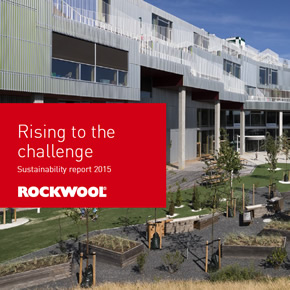
Sustainability report tackles pressing global issues
The ROCKWOOL Group has published its recent sustainability report, ‘Rising to the Challenge’. The article outlines several internal goals for the organisation to meet by 2030, in order to tackle some of the world’s toughest development challenges.
The ROCKWOOL Group boasts a long heritage in the sustainability sector: it aims to save resources by creating products from stone, a plentiful natural material.
‘Rising to the Challenge’ addresses the ways its products can tackle global issues, such as sustainability and water consumption; the report also looks inward, concentrating on the company’s operations to suggest ways in which it can reduce its own carbon footprint.
The company’s focus on sustainability – both internally and externally – is central to its transformation. The strategy has been designed to focus ROCKWOOL’s efforts on the areas where it can have the most significant impact: energy efficiency, the Circular Economy, water usage and health and wellbeing.
Energy efficiency
Research suggests that 40% of global energy is used in buildings; the majority of our existing structures are inefficient. In 2012, approximately 50 million EU populates reported their inability to maintain an adequate temperature within their homes.
Generally speaking, ROCKWOOL’s products have been designed to improve buildings’ energy consumption by providing insulation against the cold and the heat. Once installed, they can save between 80 and 1,500 times the level of carbon emissions emitted during their production and manufacture.
‘Rising to the Challenge’ states that the ROCKWOOL Group will aim to reduce CO2 emissions in its own factories by 20%, in time for 2030.
The Circular Economy
According to a study conducted by the World Bank in 2013, the amount of solid waste, on a global scale, is set to triple by the year 2100. With the construction industry accounting for around 35% of the total waste generated across the world, it must commit to reclaiming products and reducing its landfill waste.
When creating its products, ROCKWOOL aims to use secondary materials from other industries; by recycling used items and waste, it promotes resource efficiency within its factories.
By 2030, the company will offer to reclaim products in 30 countries. It also endeavours to reduce its landfill waste by a staggering 85%.
Water consumption
As the population increases, more food is needed. Agriculture requires water; yet, freshwater accounts for a meagre 4% of the world’s available resources and almost 2% of this is frozen.
To tackle the water shortage, the ROCKWOOL Group intends to reduce water consumption in its own factories by 20% by 2030. In the meantime, its GRODAN products offer an agronomic solution: the stone wool systems can produce up to three times the amount of crops grown in soil. Growing tomato crops with GRODAN typically uses 50% less water per kilogram of crop produced.
Health and wellbeing
Over 30% of the EU population are exposed to severe noise levels, which can disrupt their sleep and interfere with their daily activities. The World Health Organisation (WHO) has confirmed that excessive noise can be detrimental to human health; it can also impair our ability to learn.
Suitable for installation in classrooms, workplaces, public spaces and homes, ROCKWOOL’s solutions have been designed to optimise acoustics, reduce noise and improve interior comfort. In the past, its sound-absorbing ROCKFON ceiling products have been proven to reduce staff and patient stress in healthcare environments.
The company is also committed to improving the health and wellbeing of its employees: it aims to reduce the frequency of Lost Time Incidents (LTIs) at its sites by 10%, on an annual basis.
Contact:
ROCKWOOL,
Pencoed,
Bridgend,
United Kingdom,
CF35 6NY
Phone: 01635 862621
Fax: 01656 862302
Visit Supplier's page
Latest news

18th December 2024
BMBI: October Merchant sales rally with a +7.3% month-on-month increase
The latest Builders Merchant Building Index (BMBI) report shows builders’ merchants’ value sales in October were up +1.2% compared to the same month last year.
Posted in Articles, Bathrooms & Toilets, Bricks & Blocks, Building Associations & Institutes, Building Industry News, Building Products & Structures, Building Services, Building Systems, Civil Engineering, Cladding, Concrete, Cement, Admixtures, Drainage, Drainage Services, Floors, Garden, Hand Tools, Hard Landscaping & Walkways, Health & Safety, Heating Systems, Controls and Management, Heating, Ventilation and Air Conditioning - HVAC, Information Technology, Interior Design & Construction, Interiors, Landscaping, news, Paints, Paints, Coatings & Finishes, Pipes, Pipes & Fittings, Plant, Equipment and Hire, Plumbing, Power Tools, Publications, Research & Materials Testing, Restoration & Refurbishment, Retrofit & Renovation, Site Preparation, Sustainability & Energy Efficiency, Timber Buildings and Timber Products, Walls, Waste Management & Recycling
18th December 2024
GEZE UK announce Kids' Village charity partnership
Kids’ Village is delighted to have partnered with GEZE UK as their 2025 charity of the year – find out more via the article…
Posted in Access Control & Door Entry Systems, Architectural Ironmongery, Articles, Building Industry Events, Building Industry News, Building Products & Structures, Building Services, Charity work, Doors, Facility Management & Building Services, Health & Safety, Restoration & Refurbishment, Retrofit & Renovation, Security and Fire Protection, Windows
18th December 2024
Encon Achieves 5% Club Silver Membership
The Encon Group, the leading independent distributor of building materials, is pleased to announce that it has been awarded Silver membership of The 5% Club by the 2024/25 Employer Audit Scheme.
Posted in Articles, Awards, Bricks & Blocks, Building Associations & Institutes, Building Industry Events, Building Industry News, Building Products & Structures, Building Regulations & Accreditations, Building Services, Building Systems, Civil Engineering, Cladding, Concrete, Cement, Admixtures, Facades, Hard Landscaping & Walkways, Health & Safety, Insulation, Landscaping, Plant, Equipment and Hire, Recruitment, Restoration & Refurbishment, Retrofit & Renovation, Site Preparation, Training, Walls
18th December 2024
SWA: A focus on Steel Window Association member West Leigh
Located in Charlton, South London, SWA member West Leigh was established during the Blitz, in 1943. During the destruction in London, the company helped in repairing windows and facades that had been damaged by bombings throughout the city.
Posted in Articles, Building Associations & Institutes, Building Industry News, Building Products & Structures, Building Services, Building Systems, Case Studies, Facades, Glass, Glazing, Restoration & Refurbishment, Retrofit & Renovation, Steel and Structural Frames, Walls, Windows
 Sign up:
Sign up: